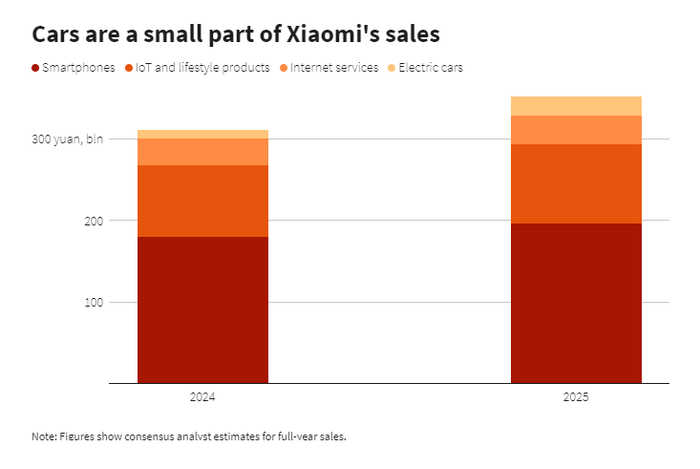Published 11:05 IST, April 2nd 2024
Xiaomi enters China’s EV race in fine form
Investors added almost $8 billion to the group's market capitalisation on Tuesday after the long weekend.
- Republic Business
- 2 min read

Dialled in. Smartphone maker Xiaomi's first car, the battery-powered SU7 sedan, is debuting in a cutthroat market where growth is slowing. But boss Lei Jun has clocked nearly 90,000 orders in 24 hours, the company said on Friday, and buyers face a wait of up to 7 months. Investors added almost $8 billion to the group's market capitalisation on Tuesday after the long weekend, suggesting they are finally taking his ambition seriously.
There was already reason to have confidence in the roadmap. Lei built his $48 billion business empire on internet-connected electronics, ranging from smartphones to robotic dogs. Chinese drivers are more and more focused on their vehicles' infotainment, dashboards and assisted driving features, making that knowhow especially valuable.
However, Lei has picked a difficult path, pricing the mid-range sporty-looking model at 215,900 yuan ($29,870). It falls within the most competitive segment in China: Lei is going head to head with Tesla's Model 3, BYD's Han, and a fleet of other established marques.
The flood of orders and a waiting list indicate the SU7 will be a more formidable rival than previously thought. Analysts expect their car sales to reach around 10 billion yuan this year, per Visible Alpha, which equates to 3.2% of Xiaomi's overall forecast revenue and just shy of 50,000 unit sales at the SU7 starting price. Xiaomi's first day of orders is close to doubling that figure.

Of course, a long wait might erode the number of would-be buyers. Ramping up production is tough, even for more experienced manufacturers. Xpeng and Tesla, for example, have seen sales held back by production constraints in the past. The project could also be a drag on Xiaomi's finances.
Assuming similar margins to peers Nio and Xpeng in their early days, and around 60,000 annual unit sales, the company would generate a net loss of around 4.1 billion yuan, Citi estimates. That compares with an 8.4 billion yuan adjusted net profit reported in interim results for the first half of 2023, and is equivalent to about half the more than $1 billion net cash the company had as of June.
Cars remain a tiny part of the business but Xiaomi is already valued at around one times expected sales for 2024, similar to Nio and Xpeng. The next challenge for Lei is to keep a lid on any losses as his new venture charges up.
Updated 11:05 IST, April 2nd 2024